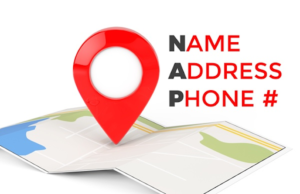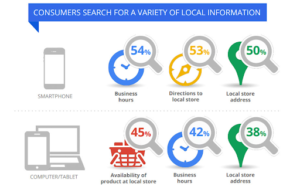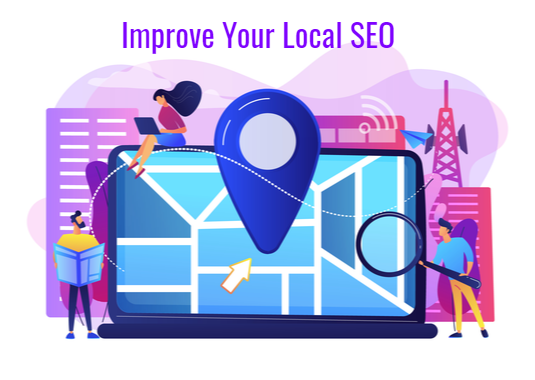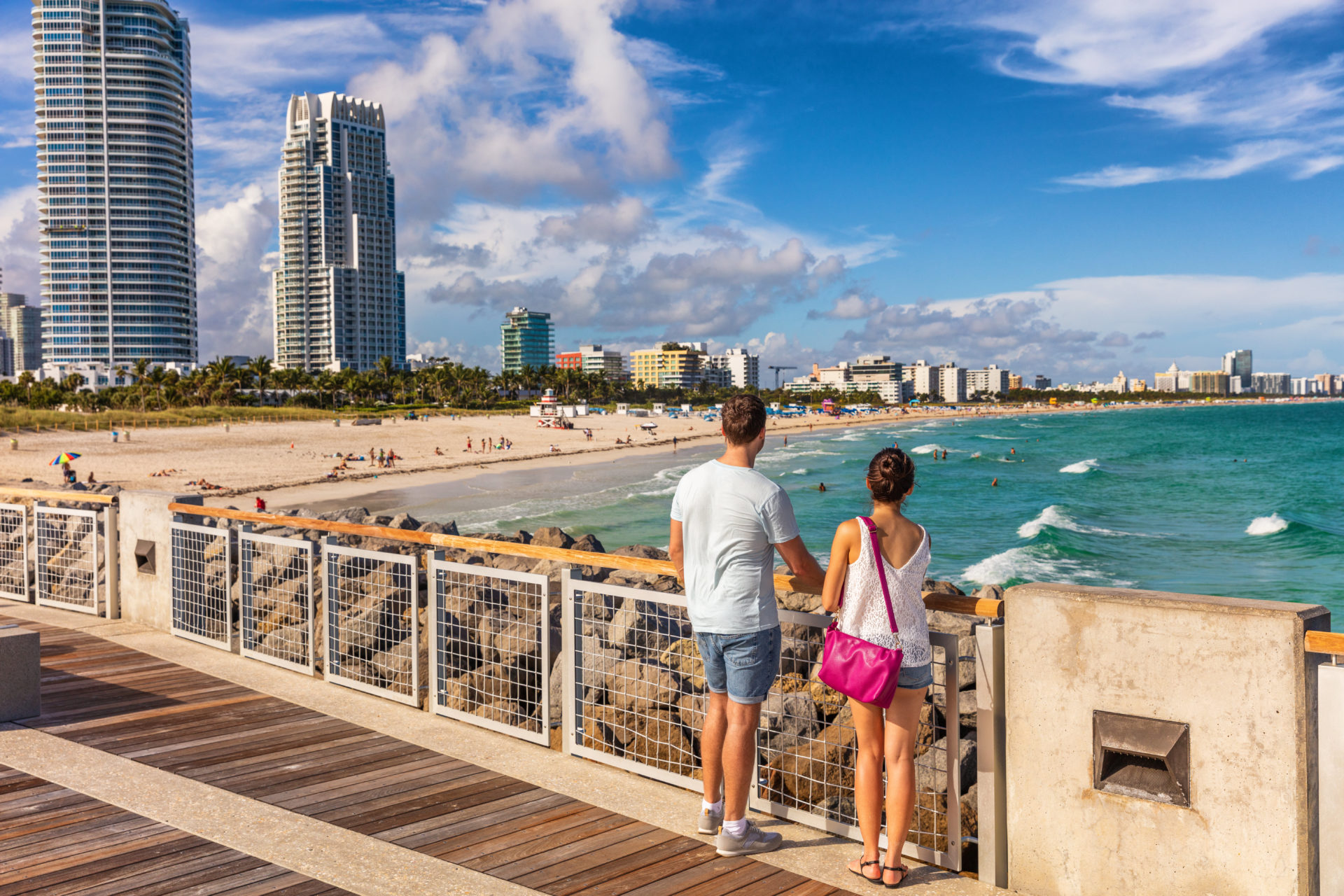Local SEO is a tricky game to master, isn't it? There are so many moving parts and details that the process can often be overwhelming. Not to mention, it takes time, effort, and money to get it right. We get it!
Despite that, the importance of local SEO can't go unnoticed. If you want your business to succeed online, you need a good local search engine optimization strategy in place, or else your competition will beat you out of those coveted spots on page 1 of Google's search engine results pages (SERPs).
With that being so, if you're thinking about ways to improve your local SEO in 2022, here's how to implement an effective strategy this year to get a jumpstart on the competition. We'll give you some "do these things now" to improve your rankings.
Table of Contents
Why is Local SEO Essential?
First things first, let's talk about why local SEO is so important. In fact, it’s an integral part of any business's overall digital marketing campaign these days.
Simply, the reason is that people use Google to search for local businesses. Whether they're trying to find the best local restaurant near them or a plumber, you can bet that more than half of the online searches are performed by location. Actually, four in five consumers rely on search engines to find information about local businesses.
This means that if you have an online presence, consumers are likely searching for your business right now on their phone or desktop computer, and they’ll make a purchase decision based on what they see in the search results.
This explains why most businesses today have some presence on Google's Search, Maps, and Photos (these make up Google My Business). In fact, Google accounts for nearly 80% of all digital ad spend. And with consumers using their platform more than any other, it’s no wonder why this is the case.
Accordingly, you can't ignore the importance of having strong SEO for your business's local page. It'll be difficult for your local customers to find you if they can't even see your website in local search results.
Fortunately, even if you aren't a pro at search engines and SEO, there are ways you can improve your local SEO. With the right plan and execution, you can create strong campaigns that'll make a difference.
How Can Local SEO Improve Local Business?
Local SEO will help you gain visibility, increase your customer base, and improve conversions. Without a local SEO strategy in place, you’ll lose out to competitors whose online presence is more visible than yours. Let's take a look at some ways local SEO can help your business grow:
Attracting Organic Traffic
This is where you can benefit the most from local SEO. You see, having your website mapped on Google has its benefits beyond just showcasing your business in the SERPs.
If people are looking for information about a certain business location (or multiple locations), this will match your website, and they'll be directed to it. In other words, if someone does a search in Google Maps and clicks on your business, they'll be taken to your Google My Business page.
From there, people can learn more about your company, like the services you offer and your location. You might even catch them clicking through to see your website or social media channels.
This means that you'll get free traffic from those looking for information about your business, similar businesses, and sometimes, industry at large!
And the best part about this is that, unlike paid ads, organic visibility is free to obtain. You just have to follow the right SEO techniques to reach customers looking for local businesses.
Improving Brand Authority
Another benefit of implementing an effective local SEO strategy is to gain authority and credibility online. Again, this is free to do, and it'll be worth your time in the long run.
If you want people to trust you and your business, all you have to do is show up where they’re searching for local businesses. For example, if someone does a Google search for "plumbers near me," the first few local search results will likely be pages from Google My Business.
So when you rank for these keywords, you're telling people that your business is legitimate and trustworthy. By using the right local SEO techniques and keyword research, you'll increase your local presence in search results and will appear in more searches than before. This alone can help build trust with consumers who might become future customers.
But remember, once you’ve mastered local SEO and improved your local ranking, you’ll want to hold on to that top spot and avoid getting demoted. Otherwise, you could lose your status and struggle to regain it later.
Driving More Leads
Another benefit of local SEO is increasing the number of leads for your business. Once you get more visibility on the web, you should see an increase in the number of people contacting you.
This can be attributed to two reasons:
1) Many first-time customers will find your business online through local searches and turn into leads.
2) Once your website improves its visibility, more potential customers will come across your page and contact you for services.
To get more leads by being visible on the SERPs, your local SEO strategy should include:
- Improving your local SEO by using the correct keywords.
- Writing compelling content that describes what you sell or offer.
- Driving traffic to your website through paid ads.
- Optimizing your site for improved user experience and SEO.
More Conversions Thanks to Targeted Traffic
Improving your local ranking will help your business attract more relevant visitors and increase conversion rates with targeted traffic. That's because local SEO, in particular, taps into your local audience who are looking to do business in their neighborhood. In other words, the searchers' intent is more clear when they search for a local business.
For example, when someone searches for “Italian food” online, it can be hard to decipher if the person wants Italian cuisine in their area or just wants information about pasta recipes, whereas when they search for "Italian food in Philly", it's more clear that the person is looking to do business locally and actually eat Italian food.
So, if people are searching for what you offer locally, they're most likely ready to purchase right away. That’s why with targeted traffic from improved local rankings, you'll see more leads that convert into paying customers. Make sure that you record your website data with a free tool like Google Analytics.
8 Key Tips to Improve Local SEO in 2022
So, what are the very specific ways you can improve your local SEO? Here's a list of 8 key local SEO tips that can certainly help you.
1. Put Your Location in Strategic Parts of Your Site
Although this may seem like an obvious tip, many businesses don't actually put their location(s) on their site. And even if they do, it's not in the best strategic spots. So, you need to make it a priority to ensure that your location is visible and easily found.
When determining where to put your address(es) on your site, think of the most strategic spots for this information. For example, if you're a restaurant or food delivery service, consider putting this on your homepage as that's the first thing visitors will see.
Similarly, if you're a plumber, perhaps consider putting your location on an about page or the footer where it won't be lost in the sea of other content on your site.
The idea is that you want to make it easy for your potential customers to find out where you're located quickly and without having to dig through pages of content.
2. Get Your NAP Right and Keep It Up-To-Date
You know that NAP stands for business name, address, and phone. We get it, you've heard this a million times, right? But did you know that these 3 aspects of your business are still something you need to pay attention to in 2022 for local SEO purposes? You do!

Typically, if you're a local business, your NAP information is standard across directories and search engine results pages. However, there's always room for improvement, so ensure you keep your data up-to-date. For example, if you recently moved locations or switched phone numbers, make sure to take action right away so that these changes are reflected online.
That way, whenever someone looks up your business, they'll always be able to find the most accurate contact information. And this is important because it's one of the top factors search engines like Google look at when determining where you rank for specific relevant keywords.
3. Optimize Your Website for Mobile Devices
This one should come as no surprise – more than 50% of internet traffic worldwide comes from mobile devices. And given the fact that most consumers use their phones to search for local businesses like yours, it's clear why this tip is so key.
If your local business website isn't optimized for mobile devices (meaning it works on a typical mobile device), then you're restricting yourself from reaching a virtually unlimited market. In fact, according to Google, a business's website should be optimized for all devices or risk being left behind in the dust.
So, if your site isn't already mobile-friendly, set aside some time and make it happen. To make it mobile-friendly, you need to have a responsive design, ensure your site can handle mobile visits, and optimize all content for mobile display so that it doesn't look stretched or distorted. In doing so, you'll be boosting local SEO!
4. Be Prepared for Voice Search
These days, more and more people use their voices to search for things online. And this is especially true when it comes to local businesses. In fact, a recent study shows that around 50% of all mobile searches (especially for shopping purposes) are made through voice.
Therefore, if you're not prepared to answer questions and optimize for voice search, then you're probably going to struggle to rank highly. So, how exactly should your business optimize for voice search?

Since most voice searches are done on mobile devices through several voice assistants (i.e., Siri, Google Assistant), your website must be optimized for mobile-first. This means ensuring it loads quickly, is compatible across all devices, and uses text content instead of Flash so that voice assistants can easily read it.
Then, when optimizing your search rankings, make sure you optimize for phrases instead of keywords. For example, if someone asks Siri to search for "Italian restaurants in NYC," the best result would be an Italian restaurant located in New York City.
In contrast, if you just target keywords, you might rank for "NYC restaurants" or "Italian cuisine." But this will make you seem less relevant compared to the NYC-based restaurant.
Finally, focus on creating a knowledge graph and publishing content that answers frequently asked questions about your business or industry. This won’t only boost your website's ranking, but it'll also give you an upper hand when it comes to voice search.
5. Show Up on Online Business Directories
Another way to ensure that potential customers see you is by getting your site listed in relevant directories. And this goes beyond just the big-name industry-specific sites like Google Business, Yellow Pages, Yelp, and Merchant Circle (although these are important).
Instead, look for smaller sites that might be specific to your region or industry. For example, if you're a florist in the Rocky Mountains, sign up for directories like Winter Park Flowers and The Flower Finder. Another option is to check out the local chamber of commerce for listings that you can add to your site.
In some cases, directory business listings might cost money – but this will depend on the entity and how much website traffic it receives.
However, most sites won't require any payment to list a website – they'll simply ask you to fill in a form with basic details about your business. And in return, you'll have access to a new audience who can visit your site and learn more about your products or services.
6. Encourage Online Reviews
The modern consumer loves reading reviews about businesses on sites like Google My Business, Yelp, TripAdvisor, and beyond. Not only that, but studies show that people are more likely to make a purchase if they read positive reviews online.
In fact, around 95% of consumers read reviews before making any purchase, and 8% discover new local businesses through them. And this is especially true for online channels, where reviews are often used as a proxy for how good or bad a company's products or services are – that's the best advice they seek.
Therefore, as a website owner, if you want your business to rank higher on Google search results (and even show up first on local listings), you need to encourage customers to write Google reviews about your business.
Simply asking customers to leave reviews can have a big impact on your business because it shows that other people are happy to recommend your business – which means that more customers will be likely to follow suit. Furthermore, it gives other potential customers the confidence to buy from you.
To ask for reviews, you can create a page on your site dedicated to reviews and link it from your homepage, include a review request form or widget on your website and incorporate it in your emails, or even encourage face-to-face customers to write reviews during checkout or after the sale. There are plenty of ideas – all you have to do is ask!
7. Optimize for Google Maps
Research has shown that people engage more with businesses they can physically visit or walk into (just think about how often you Google search for a local business while you're out and about).
Although most Google searches are still for generic keywords, people still search with intent, typing words into Google with a purpose in mind. And if they want to visit your store, they'll use their phone or tablet to find your address and location information on Google Maps.
This means it's essential that you have a strong presence on Google, and that starts with optimizing your business for Google Maps.
The good news is that this type of optimization doesn't take as much time as you might think. All you need to do is claim your Google My Business page and add as many details about your business as possible on your Google business profile.

Then, you can optimize this information for Google Maps by including keywords in the following areas: location, hours of operation, phone number, address, and you can even optimize images and videos (although this is optional).

8. Consider Crafting Local Content
Although content marketing is a proven way to grow any business, many local businesses struggle with creating relevant content for their customers. In addition, when they do create content, it's often generic and not written specifically for their audience. This means it doesn't perform anywhere near as well as it could.
However, that's an easy mistake to fix because Google rewards local businesses that create rich content relevant to their customer base and produced with a specific geographic target in mind. This means you need to put yourself in your customers' shoes and consider what they’re searching for when researching local businesses.
Once you know what your customers want, try creating content that answers these questions and more: Where should I eat? Where is the best place to get a haircut near me? Where can I go for a walk in my neighborhood? What's happening this weekend around here? And so forth.
For instance, a digital marketing strategy that really works is to publish helpful articles and blog posts about the issues people in your local area might have as well as local news. After all, consumers searching online are looking for information – not just a business selling products or services.
Actually, writing local blog posts will improve your site's trustworthiness, as it shows visitors that you’re a legitimate brand with valuable information. In turn, this will make it more likely for people to click on your site in the search results and become customers.
9. Get Inbound Links from Relevant Websites
Attracting inbound links from relevant sites is another type of local SEO that can help boost your rankings in the SERPs. Inbound links are a sign of trustworthiness, so if you have a good amount of them, Google will be more likely to show your site in its search results.
In short, Google will give a website a ranking boost when they see an incoming link with relevant anchor text pointing to them from another reputable website or authority site. So, if you have connections at other websites within your niche, ask for high-quality backlinks that use anchor text relevant to your local service or product (e.g., "best plumber in London").
Not only will this type of inbound link help you with your Google rankings and get you more traffic, but it'll also provide referrals from those websites. And as we all know, referrals are one of the best ways to grow any business!
10. Use the Right Keywords in Your Title Tags & Descriptions
Using the right local keywords is essential for local SEO success. You need to make sure that you're using location-centric keywords on your site (and social media) so that it appears in the correct search results for locals looking for your business.
For instance, if you're a restaurant in New York City called "Pizza Heaven," users will use search queries like "best pizza NYC" or "NYC pizza." Therefore, if you're trying to improve your local rankings in the SERPs, make sure to include keywords like "pizza" and "NYC" and use them in relevant areas on your site. This type of practice is known as on-page SEO.
Another good method is to include these keywords in your title tags, meta descriptions, image file names, and image ALT tags. This is because Google uses these to judge what your page is about, so they must be relevant to your business.
11. Make the Most Out of Social Listening
Social listening has become a widely used platform as far as marketing and customer service goes, and is an essential part of local SEO. Small businesses taking advantage of social platforms like Twitter and Facebook to listen to what their customers are saying about them will see better results than those who don't.
This is because social media is one of the best tools to see what your customers are looking for and provide them with great content or promotions that make them want to visit your site.
For example, if someone said on Twitter that they were craving sushi in Boston this weekend, you could respond with a tweet saying, "Just the thing I was thinking! Enjoy our $5 all-you-can-eat sushi this weekend at @SushiTemptation!"
Not only would this help you with marketing for your social media profiles, but it'll also provide potential customers with all the information they need to know about your business – making them more likely to click on your website.
Are You Hurting Your SEO?
Before you try to improve your local SEO, make sure that you’re not inadvertently hurting it with these common blunders:
- Not including targeted local keywords in your meta titles, descriptions, and other areas.
- Creating duplicate content on the same site.
- Creating content that isn't relevant to local searches.
- Actively ignoring the opportunities for your business to appear on local SERPs, such as Google Maps or Yelp.
- Having a complex website structure to navigate, which can lead to users bouncing from your site.
- Including links to irrelevant content on other websites, especially high-authority ones, which could lead to a Google downgrade or penalty.
- Not having a unique name for each page.
- Having too many ads or pop-ups that might distract users from clicking through to your site.
- Having sporadic backlinks without following any plan or strategy.
Instead, here are some of the elements that you should ensure:
- Check your "permalinks" to make sure that you're not using a ton of unnecessary keywords. If possible, try creating custom permalinks that are short and simple.
- Remove links that you might have on your site to a competitor's website. For example, if a customer references a rival company, find a way to replace this mention with a positive review about your own business instead.
- Make sure to create fresh, valuable content regularly so that you don't have any gaps in your organic search history.
- Keep the content relevant and concise - if your business fails to stay on topic when creating blog posts and press releases, it'll be difficult for search engines to provide accurate results.
- Ensure that the images on your site are properly optimized for SEO by using descriptive filenames, ALT tags, and bulletproof links.
- Be sure not to include too many keywords in your text and images as search engines may misinterpret them as spam.
- Make sure to have a complete business listing- if you don't have complete profiles on Google My Business and other local directories, people won't find you using a search engine.
- Use more reviews and testimonials - the more positive reviews your business can get, the more people will trust it.
FAQs
What Are Some Examples of Local Keywords?
Some examples include your city, state or province, landmarks, zip codes, neighborhoods, and similar. Try using Google AdWords Keyword Planner to see what sort of words people are searching for in your area.
What's the Difference Between Local & Organic SEO?
Though there are overlapping factors, organic SEO is focused on the general terms users type in when searching online—people might search for "Italian food" or "NYC restaurants", for example.
In contrast, local SEO is focused on specific locations or places – users will be searching for a particular city, neighborhood, or landmark, such as "best Italian restaurant in Manhattan" or "NYC's best bagels."
How Can Small-Business Owners Attract Inbound Links?
There are plenty of ways to get inbound links from other sites, including:
- Creating resources that answer questions that potential customers might have. If you become an authority for this topic, other websites may link to your content in turn (this is called guest posting).
- Try reaching out to other bloggers and journalists in your industry. They may be interested in writing a story about you or your business if they find you interesting.
- When you write new content, add a backlink to another website if the article references it. For instance, if you wrote an article about how brick pavers can improve your business's curb appeal, include a link to their site (or vice versa).
What’s the Best Type of Content for Local SEO?
The best type of content for local SEO is written content that targets specific keywords relevant to your local business and its service area (e.g., "best electrician in NYC"). When creating this content, make sure that your site is also linking to other pages on your website for more context.
What Is the Importance of Local SEO in 2022?
Local SEO is essential in 2022 and beyond because more and more people now perform searches on their smartphones to find businesses in their immediate vicinity. As a result, businesses need to optimize their websites to appear at the top of relevant local searches.
Otherwise, they'll lose out on attracting new customers that they potentially could have had.
Ready to Dominate Local Search?
The best local SEO strategies are the ones that have a long-term vision in mind. With this mindset, you’ll be able to implement efficient strategies that generate stable results.
If you feel that your business could benefit from improved local rankings, now’s the time to hire help! With the expertise needed to tweak your site, it’ll be optimized for all local searches in 2022 and beyond.




